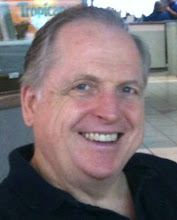As I work on editing this blog for publication I ask myself, "Why would anyone want to read this blog or my book?" What value have I added in the 243 posts that make up this blog to date?
When I first started the blog I wanted the discipline of writing a daily blog to create a book I could publish. I've worked on several books ad went to a Book Expo in Chicago in 2001 with the intention of publishing and marketing a book. To date, the only book I have published (in 1992) was my 502-page dissertation. (Very few people read it, by the way.)
I have several books started and have a goal of writing some fiction targeted for young adults. I've been an avid reader in that literature for the last six years to build-up a better understanding for the authors, the books, and the genre.
What is this blog about? That's a challenge. The blog is about many things. Wikipedia.org has this to say about a blog:
A blog (a contraction of the term "web log")[1] is a type of website, usually maintained by an individual with regular entries of commentary, descriptions of events, or other material such as graphics or video. Entries are commonly displayed in reverse-chronological order. "Blog" can also be used as a verb, meaning to maintain or add content to a blog.
Many blogs provide commentary or news on a particular subject; others function as more personal online diaries. A typical blog combines text, images, and links to other blogs, Web pages, and other media related to its topic. Source: http://en.wikipedia.org/wiki/Blog.
This blog reflects what I was thinking about, "top of mind," on the day I wrote each post. I have gone through the blog in the course of preparing it for editing and publishing and have identified categories that have related posts. These are still "across the board."
My primary role is as a "trusted advisor" and many of my posts contain information to be shared from that point of view about the topic included in the post.
This still a challenge for readership. I'm adding posts each day to the blog and to the book until the day I publish it. Blog posts made after the publication of the first book will be saved for a follow-on book. I have a few friends who read the blog often. (They should, many of their ideas and our discussions find their way in to the daily posts.) I also have two subscribers to the blog--and I am one of them.
I've explored with other friends in the publishing and bookselling business to see how I can edit the content in a way that will make it compelling for others to read. I'm still developing those ideas.
Another editing challenge I have is to make the links show-up in the published document. On the website and the blog, the links work. In print, they need to be spelled out. Many of my posts include related links for more information and for examples.
What are your thoughts?
Showing posts with label trusted advisor. Show all posts
Showing posts with label trusted advisor. Show all posts
Thursday, April 1, 2010
Friday, November 6, 2009
Becoming a Trusted Advisor--Independent Consulting for Businesses, Not-for-Profit Organizations, and Schools
Syms, in its advertising, says that "an educated consumer is its best customer." There is a problem about having educated consumers as customers in the consulting services marketplace. While there are multiple markets, three serve as practical examples--businesses, not-for-profit organizations, and schools. When leaders in any of these three markets feel a need for consulting services, they go to trusted providers. Businesses usually go to consulting firms rather than to individuals. Not-for-profit organizations look for consulting firms specializing in their kind of organization. Schools frequently look to universities as their source for trusted advisors.
Regardless of how much education and practical experience consulting professionals may have, there is no "instant" way to become a trusted advisor. Another challenge is that, once someone becomes a trusted advisor the relationship may be considered more personal than professional--making it more difficult to charge and to collect an hourly fee.
LinkedIn.com encourages members to solicit recommendations from others in the member's network. Recommendations can help begin to build trust between professionals. Rather than mastering the "Google Ad Words" promotion, it is challenging to create an electronic footprint that allows for people to discover a new "trusted advisor." Videos on YouTube may be one source for initial connections.
Regardless of how much education and practical experience consulting professionals may have, there is no "instant" way to become a trusted advisor. Another challenge is that, once someone becomes a trusted advisor the relationship may be considered more personal than professional--making it more difficult to charge and to collect an hourly fee.
LinkedIn.com encourages members to solicit recommendations from others in the member's network. Recommendations can help begin to build trust between professionals. Rather than mastering the "Google Ad Words" promotion, it is challenging to create an electronic footprint that allows for people to discover a new "trusted advisor." Videos on YouTube may be one source for initial connections.
Subscribe to:
Posts (Atom)



